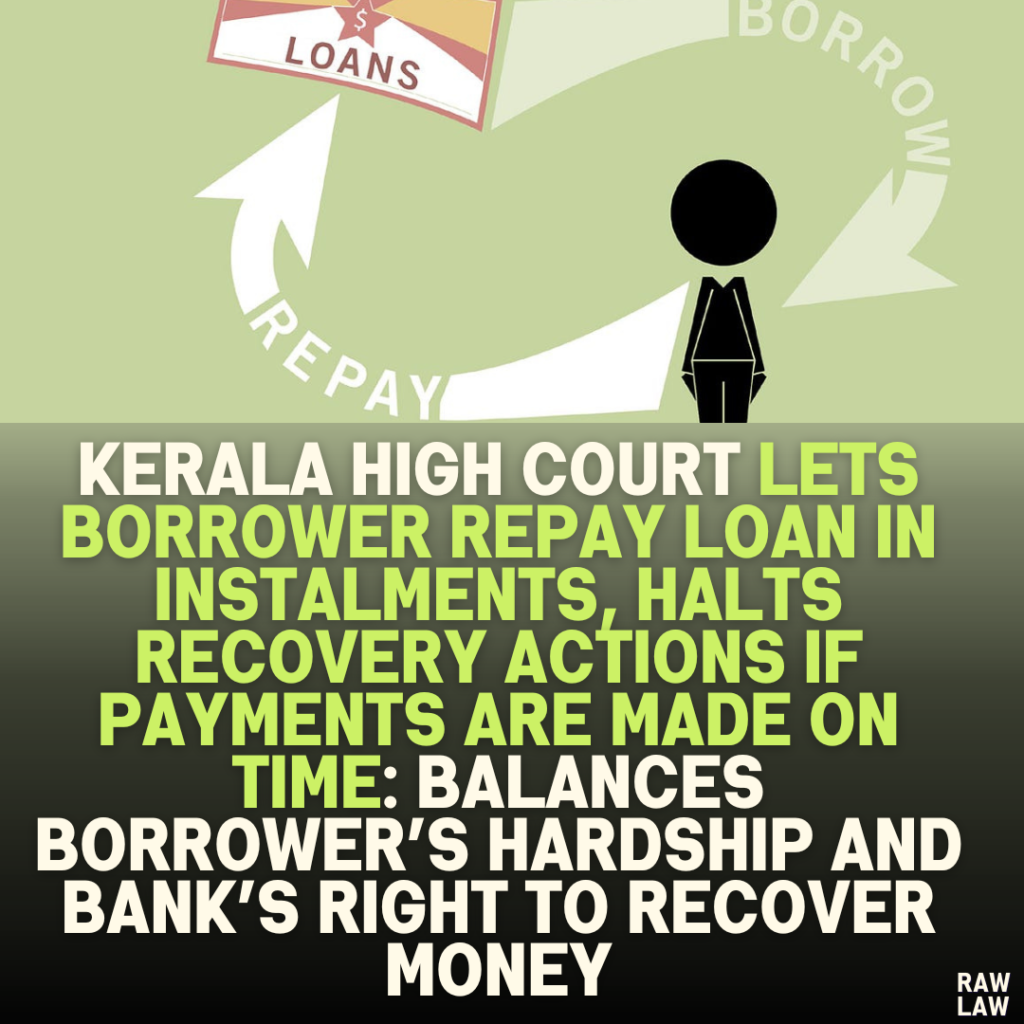Court’s Decision
The Kerala High Court allowed the petitioner to repay the outstanding loan of ₹6,15,664 in 12 consecutive and equal monthly instalments. The repayment would include accrued interest and applicable bank charges. The court held that coercive recovery actions initiated by the respondent bank would be deferred if the petitioner adhered to the repayment schedule. However, the respondents were given liberty to resume coercive actions in case of any default.
Facts
- Loan Availment and Defaults:
- In 2016, the petitioner obtained a loan of ₹3 lakhs from the respondent co-operative bank.
- Initially, repayments were made promptly, but the petitioner later defaulted on the instalments.
- Petitioner’s Plea:
- The petitioner cited unavoidable circumstances as the reason for defaulting.
- He expressed willingness to clear the overdue amount if provided reasonable time to pay in instalments.
- The petitioner feared significant hardship and loss if coercive proceedings and the auction of secured assets proceeded.
- Respondent’s Actions:
- The respondent bank issued a notice under the Kerala Co-operative Societies Act, 1969, initiating coercive recovery measures for the overdue loan.
- As of 21.11.2024, the total outstanding amount was ₹6,15,664.
Issues
- Should the petitioner’s plea for instalment-based repayment be entertained despite defaults?
- Were the coercive proceedings initiated by the respondent bank under the Kerala Co-operative Societies Act valid?
Petitioner’s Arguments
- Circumstantial Default: The petitioner argued that the default occurred due to factors beyond his control and was not deliberate.
- Repayment Commitment: He demonstrated readiness to clear the dues if granted the facility of easy monthly instalments.
- Hardship Due to Coercive Action: The petitioner contended that coercive measures, including the auction of secured assets, would cause undue hardship and irreparable loss.
Respondent’s Arguments
- Repeated Defaults: The bank stated that the petitioner consistently failed to meet repayment obligations despite repeated reminders.
- Legal Validity of Coercive Proceedings: Invoking the Kerala Co-operative Societies Act, the respondents justified their actions as lawful and necessary to recover the dues.
- Outstanding Amount: They highlighted that as of 21.11.2024, the overdue amount stood at ₹6,15,664, and there was no viable reason to defer recovery proceedings.
Analysis of the Law
- Kerala Co-operative Societies Act, 1969: The Act permits co-operative banks to initiate recovery proceedings against defaulters to recover outstanding dues. These proceedings include issuing notices and auctioning secured assets.
- Judicial Equitable Powers: Courts under Article 226 of the Constitution can provide equitable remedies in disputes involving loan recovery. These remedies aim to balance the borrower’s financial distress against the creditor’s right to recover dues.
In this case, the court acknowledged the petitioner’s initial adherence to repayment and the circumstances leading to default. It exercised its discretion to offer relief while safeguarding the respondent bank’s interests.
Precedent Analysis
Although no specific judgments were cited, the decision reflects principles commonly upheld in similar cases:
- Courts consider the petitioner’s willingness and ability to repay dues when granting relief.
- Coercive actions are deferred only when the court is satisfied that the borrower’s offer of repayment is genuine and backed by sufficient security.
Court’s Reasoning
- Consideration of Petitioner’s Circumstances:
- The petitioner initially adhered to the repayment schedule and only defaulted later due to uncontrollable factors.
- The petitioner had provided substantial security to the bank, mitigating the risk of loss.
- Balancing Interests:
- The court sought to balance the hardship faced by the petitioner with the respondent bank’s legal right to recover dues.
- A repayment plan was deemed a fair solution to ensure compliance without causing undue distress.
- Conditions for Relief:
- The court imposed clear conditions: repayment in 12 equal instalments with accruing interest, failing which coercive measures could resume.
- This approach ensured that the petitioner would be held accountable while granting temporary relief.
Conclusion
The court disposed of the writ petition with the following directives:
- Repayment Plan:
- The petitioner was ordered to repay ₹6,15,664 in 12 equal monthly instalments.
- Payments would include accruing interest and any applicable bank charges.
- The first instalment was to be paid by 23.12.2024.
- Consequences of Default:
- If the petitioner failed to make any instalment, the respondent bank was allowed to resume coercive recovery measures, including the auction of secured assets.
- Deferral of Coercive Actions:
- Coercive proceedings, if already initiated, would be deferred as long as the petitioner complied with the repayment schedule.
Implications
This judgment highlights the judiciary’s role in balancing the rights and obligations of both borrowers and creditors. Key implications include:
- Relief for Borrowers: Borrowers demonstrating genuine willingness to repay can secure relief from coercive measures.
- Accountability for Compliance: Clear repayment conditions ensure that relief is conditional on accountability.
- Equitable Justice: Courts can prevent undue hardship for borrowers while safeguarding creditors’ financial interests.




Pingback: Delhi High Court Quashes FIR in Matrimonial Dispute Following Amicable Settlement: “No Useful Purpose Shall Be Served by Keeping the Case Pending When Chances of Conviction Are Bleak” - Raw Law
Pingback: Supreme Court Directs KPSC to Expand Rank Lists to Address Unfilled Vacancies: Balances Autonomy, Merit, and Equity, Emphasizing “Merit and Equity Cannot Be Undermined” - Raw Law